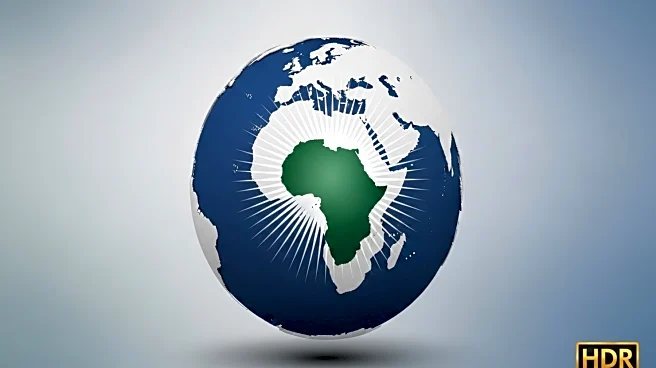What is the story about?
What's Happening?
The African Union (AU) has launched a campaign to replace the Mercator projection map with a more accurate representation of Africa. The Mercator map, created in the 16th century, distorts land sizes, making Africa appear smaller than it is. The AU, comprising 55 African nations, supports the Correct the Map campaign, advocating for the Equal Earth projection, which better represents Africa's true size. The campaign aims to correct misconceptions and highlight Africa's global significance. The Mercator map has been widely used for navigation, enlarging areas near the poles and shrinking those near the equator, affecting Africa's depiction.
Why It's Important?
Accurate map projections are crucial for education, geography, and understanding Africa's role in the global community. The Mercator map's distortion impacts perceptions of Africa's size and importance, affecting its representation on the world stage. The AU's campaign seeks to address these issues, promoting a fairer depiction of Africa. This effort could influence educational materials, global awareness, and policy discussions, potentially altering how Africa is viewed internationally. The campaign also highlights the need for equitable representation in global narratives, challenging long-standing biases.
What's Next?
The AU aims to replace the Mercator projection with the Equal Earth projection as the standard global map. This change would require widespread adoption in educational and official settings. The campaign may face resistance from institutions accustomed to the Mercator map, but advocacy groups are working to promote the Equal Earth projection in African classrooms. The AU's efforts could lead to broader discussions on map accuracy and representation, influencing global standards and perceptions. The campaign's success depends on collaboration with educational and governmental bodies worldwide.
Beyond the Headlines
The campaign raises questions about historical biases in map-making and their impact on global perceptions. It challenges the dominance of Western-centric views in cartography, advocating for a more balanced representation. The initiative could spark debates on the ethical implications of map distortions and their influence on cultural identity and pride. By promoting the Equal Earth projection, the AU is not only addressing geographical inaccuracies but also striving for a shift in how Africa is perceived globally, potentially fostering greater respect and understanding.

















